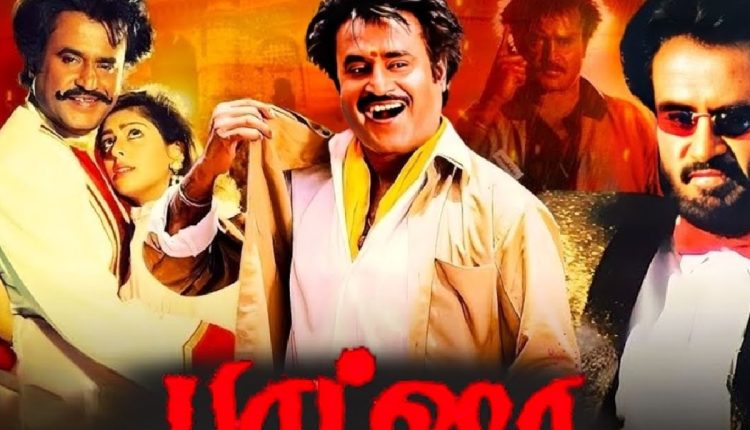There are movies. There are blockbusters. And then, there’s Baashha—a film that didn’t just break records, it broke rules, norms, and every ceiling of mass appeal.
Released in 1995, Baashha wasn’t just a hit. It was a phenomenon. It transformed cinema screens into temples and Rajinikanth into a mythical being. Even after nearly three decades, the film still commands cheers, whistles, and goosebumps with every rewatch.
Why? Because Baashha isn’t just a film. It’s an emotion.
The Plot: Simplicity, Power, and Purpose
At its core, Baashha tells the story of Manikkam, a humble auto driver in Chennai who lives a quiet life, away from violence, devoted to his family. But beneath his calm exterior lies a storm—the past life of Manik Baashha, a feared underworld don from Mumbai who gave it all up for peace.
When his loved ones are threatened, the lion awakens. And from that moment on, cinema history is made.
This is not just a story of a man’s return to power. It’s the story of a man who chose peace over pride, love over vengeance, until destiny forced his hand.
Rajinikanth: From Superstar to Immortal
If Rajinikanth had a thousand iconic roles, Baashha is the crown jewel. He didn’t just play Manikkam—he became him. His transition from the soft-spoken auto driver to the terrifying Baashha was nothing short of spine-chilling.
“Naan oru thadava sonna, nooru thadava sonna madhiri.”
(“If I say it once, it’s equivalent to saying it a hundred times.”)
That dialogue didn’t just become popular—it became part of Tamil pop culture. People quote it at weddings, interviews, and even casual banter. Such was the power of his portrayal.
In every frame, Rajini delivered charisma, subtlety, rage, and grace with godlike precision. And when he walks into the villain’s lair in that black shirt, sunglasses gleaming?
Time stopped. Fans screamed. Cinema worship began.
Dialogues That Defined an Era
Suresh Krissna’s direction, backed by punch-packed writing by Balakumaran and music by Deva, gave us dialogues etched into Tamil cinema history:
“Unakku enna venum? Kasaa? Thangama? Maana? Veedu? Car? Bank balance?”
“Baashha innoru vaati vandha… indha oora thirupi adichuduvaan!”
Each line was delivered with style, weight, and raw energy. This wasn’t cinema. This was mass elevation at its best.
Deva’s Music: The Mass Soundtrack
Composer Deva elevated the film with one of the most unforgettable albums of the decade:
🎵 “Style Style Thaan” – a swagger anthem that became the pulse of 90s Tamil Nadu
🎵 “Naan Autokaaran” – playful, catchy, and celebratory of blue-collar pride
🎵 “Baashha Paaru” – the ultimate introduction track, oozing attitude
🎵 “Aathichudi” – emotionally driven, rich with Tamil culture
These weren’t just songs—they were explosions of mood and masculinity.
The Villain, The Screenplay, The Swagger
Raghuvaran, as the stylish and ruthless villain Antony, gave Rajini the perfect foil. His suave evil clashed perfectly with Rajini’s silent menace. The screenplay built tension masterfully, delaying Baashha’s transformation, letting anticipation build until the dam bursts.
When Manikkam finally shows his true self, it’s not just his enemies who are shaken—we, the audience, felt the earth shift beneath our feet.
Baashha’s Legacy: More Than a Movie
-
It set a template for mass entertainers that Tamil cinema still follows
-
It created the blueprint for the “dual identity” hero arc
-
It made the word “Baashha” synonymous with power, style, and swag
-
It became the benchmark for Rajini’s mass appeal—and arguably, his greatest performance
Even today, fans create Baashha-style edits, quote the lines, remix the songs, and celebrate the film as a cultural milestone.
Conclusion: Baashha Will Always Be Baashha
Some films entertain. Some leave a mark. But Baashha? It burned itself into our collective memory.
It told us that you could be humble and powerful, soft and strong. That real strength isn’t in revenge—but in restraint. Until it’s time to rise. And then, when you rise—you rise like Baashha.
If you’ve never watched Baashha, you haven’t truly experienced Tamil cinema. And if you’ve watched it… chances are you still get goosebumps when Manikkam pulls out that black shirt.
Rajinikanth didn’t act in Baashha. He became Baashha.
And some legends?
They don’t fade. They reign.


Comments are closed.